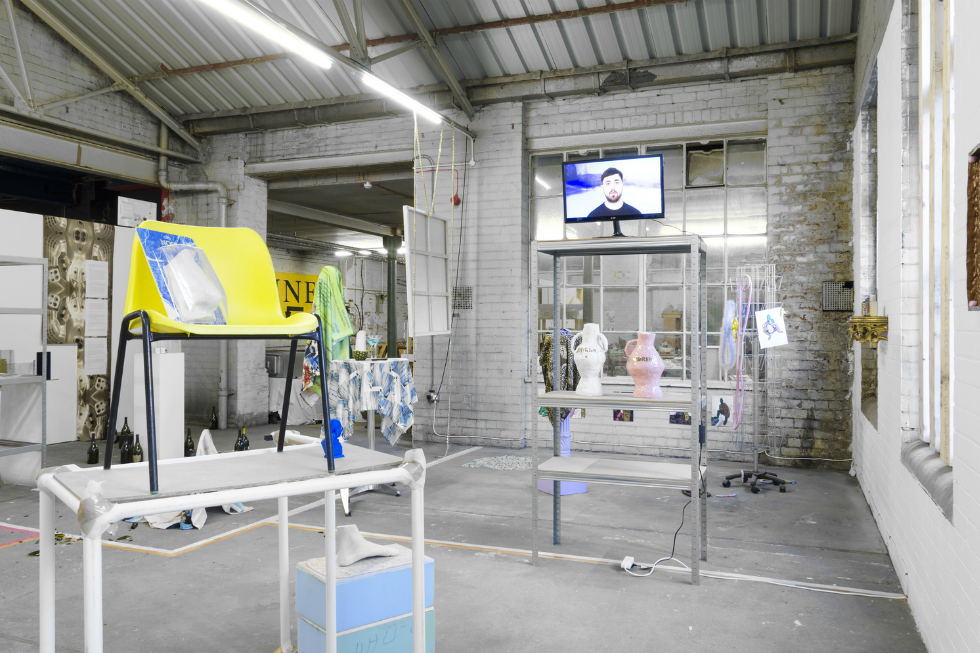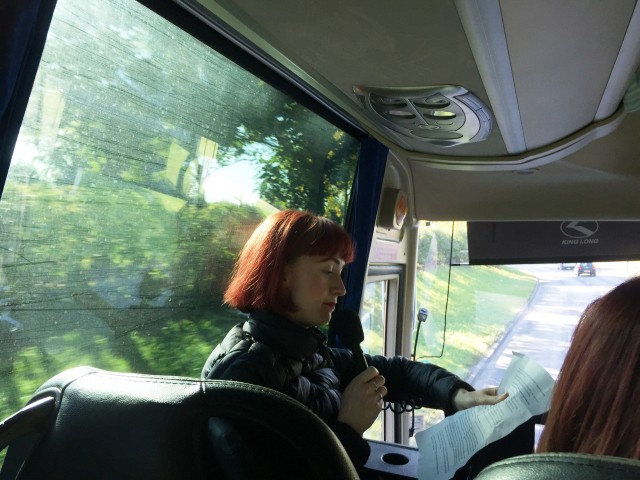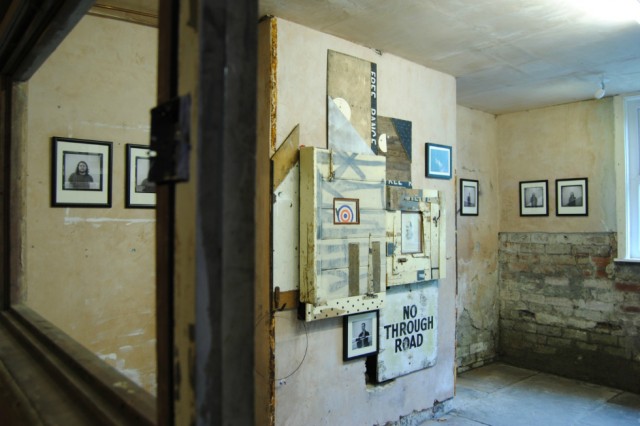Introducing: About Time, Leeds

Collaboration, collaboration, collaboration: some of the best and brightest independent art spaces in Leeds are joining forces to highlight their work. It’s About Time, says Jade French…
Leeds is buzzing. The influential British Art Show 8 has opened at Leeds Art Gallery; taking place every five years, it surveys the best of the UK’s contemporary art scene and in the past has launched the careers of Anish Kapoor, Rachel Whiteread and more. But I haven’t visited Leeds to see this blockbuster show. Alternatively, I am here to explore its grassroots arts scene via the Arts Bus, a coach tour of the city organised by an opportune new initiative, About Time.
Not just an alternative arts tour, About Time offers a large satellite programme of contemporary arts which cleverly coincides with the British Art Show 8, utilising the city’s increased footfall and appetite for culture during this time. Led by indie-organisations Mexico, Pavilion and SPUR – and with contributions from Assembly House Leeds [pictured, above], Basement Arts, Black Dogs, Leeds Animation Workshop, Left Bank Arts, Pyramid of Arts, SEIZE, Set The Controls For The Heart of The Sun and many others — the About Time programme features commissioned artworks, texts and events which aim to highlight the work of artists, cultural producers and curatorial projects based in Leeds.
Underpinning the programme is an interest in the relationship of art to globalisation. On first look, I was sceptical about this theme, mainly because it is one I have seen played out several times before. Why globalisation? And how does that connect with Leeds?
Keen to get started and find out more, I embarked the Arts Bus with excitement reminiscent of a school field trip. Leading this tour were the About Time organisers, Pavilion’s Gill Park and SPURS’ Elspeth Mitchell [pictured]. On the itinerary were four venues; Left Bank, Assembly House, Basement Arts and SEIZE. Even though I study in Leeds, I have never visited any of these spaces before.

For me, this highlighted an interesting point; many independent arts initiatives are often resident outside city centres – due to cheaper rent and larger premises — and therefore out of the public’s awareness. This challenge became one of the motivating factors for developing About Time, as Park explained. “The artist-led sector in Leeds is very well-connected, but of course, marketing is always difficult for small organisations and we hope About Time will help raise awareness about the activity that goes on outside of the main galleries”.
After driving out of the city centre, passing the historic Leeds Industrial Museum in Armley Mills, we arrived at artist-led studios and project space Assembly House. Situated in an aged textiles mill along the Leeds-Liverpool canal, the studio plays host to a varied group of creatives with work ranging from fine art painting and sculpture, to illustration, photography and design. It is reminiscent of Liverpool’s The Royal Standard or Crown Building Studios. During a tour by directors Mike Winnard and Lester Drake, they told us how Assembly House originally came into being. “Many of our peers who’d graduated previously would either move home or try to make it out in London”, said Drake. “Moving back home often meant the slow death of arts practice, and the stories from those in London were filled with struggle and artistic practices driven by commercialism”.
Immediately this struck a chord with my own experiences of graduating with an arts degree. I struggled through the latter. “For us, neither of these were options”, Drake continued; “we already knew Leeds well, there was a growing sense of it as a city you could make your own opportunities in and the cost of living isn’t a struggle to meet.”
Leeds — like Liverpool — has a growing independent arts scene which is in part due to the city’s affordability. However, similar problems are occurring in both places, in that many of these independent studios are precarious, with insecure rental agreements or minimal funding. This was recently highlighted by the threatened closure of Set The Controls To The Heart Of The Sun: an artist-led organisation in Leeds (named via an artist’s commission by Rory Macbeth — now Head of Art at Liverpool John Moores University — referencing the 1968 Pink Floyd song) housing studios, a project space, a permanent collection and a bookshop across two floors on Wharf Street. Recently announced via Instagram, the organisation stated: “We face closure in a matter of weeks unless we can fundraise a large amount of money”. The organisation has managed to stay open, but for how long?

The About Time tour group piled back on to the bus and headed to the next stop; Basement Arts [pictured, above]. As the bus pulled up I could hear whispers of “Are we here?” and “Is this it?”… What those of us who were unfamiliar with Basement Arts did not know is that this space was in a domestic setting: in others words, in someone’s house. That someone is Bruce Davies. He has been running Basements Arts from his home basement since April 2011, taking exhibiting artists offsite to events such as the Stockholm Independent Art Fair and Liverpool Biennial.
Stood outside his mid-terraced house, Davies kindly invited us in: down the corridor, through the kitchen and down the basement steps. Although the space is small, it has plenty of light, and its unplastered, rough walls and floors give it a fantastic atmosphere. It’s a million miles away from a white cube. Basement Arts feels incredibly personal and gets me thinking about the macro versus micro arts scene, and suddenly About Time’s theme of globalisation is starting to take shape.
My highlight? Being able to see About Time’s city first-hand, through the eyes of the artists that live here. Visiting the organisations in a group, driving past the old mills, offered me a new insight into the – originally confusing — theme of globalisation: Leeds is well-known for its connection to textiles, but these former mills have now taken on important new lives as art studios and make-shift galleries with international reach. Interestingly, they are also operating as data centres and offices for digital SMEs: Leeds’ reputation as one of the UK’s biggest Internet server hubs — and as one of the top five tech startup clusters outside of London — hints at a technological future that departs from its industries of the past.
It is obvious that About Time is not just about making the most of a valuable influx of British Art Show 8 visitors: really, it’s about collaborating and developing crucial networks. About Time champions the smaller independent organisations, offering strength in numbers. “For my group, SPUR”, explains Elspeth Mitchell, “About Time has meant being able to realise projects that we wouldn’t have been able to necessarily do on our own.”
Proving, perhaps, that it is indeed about time to have important conversations which ask what is this city’s potential? Is Leeds doing enough to support homegrown arts? And with the spotlight of the British Arts Show 8, isn’t it about time to shine a light on the thriving artists and art spaces also existing within the city?
Jade French
See About Time at venues across Leeds until January 2016. Upcoming:
Images and Journeys, Sunday 6 December 2015, 1-3pm
Peter Gidal/ Mark Fell: Film/ Sound, Monday 7 December 2015 6.30-8pm
Capitalist Realism – A Critical Reading, Sunday 13 December 2015, 2-3.30pm
To the editor of Amateur Photographer, Thursday 17 December 2015, 6.30-8pm
Images, from top: Faux Show exhibition at Assemby House Leeds by (its all) Tropical; SPURS’ Elspeth Mitchell leading the Art Bus tour; Alistair Woods’ Subjected to Change exhibition at Basement Arts Project





